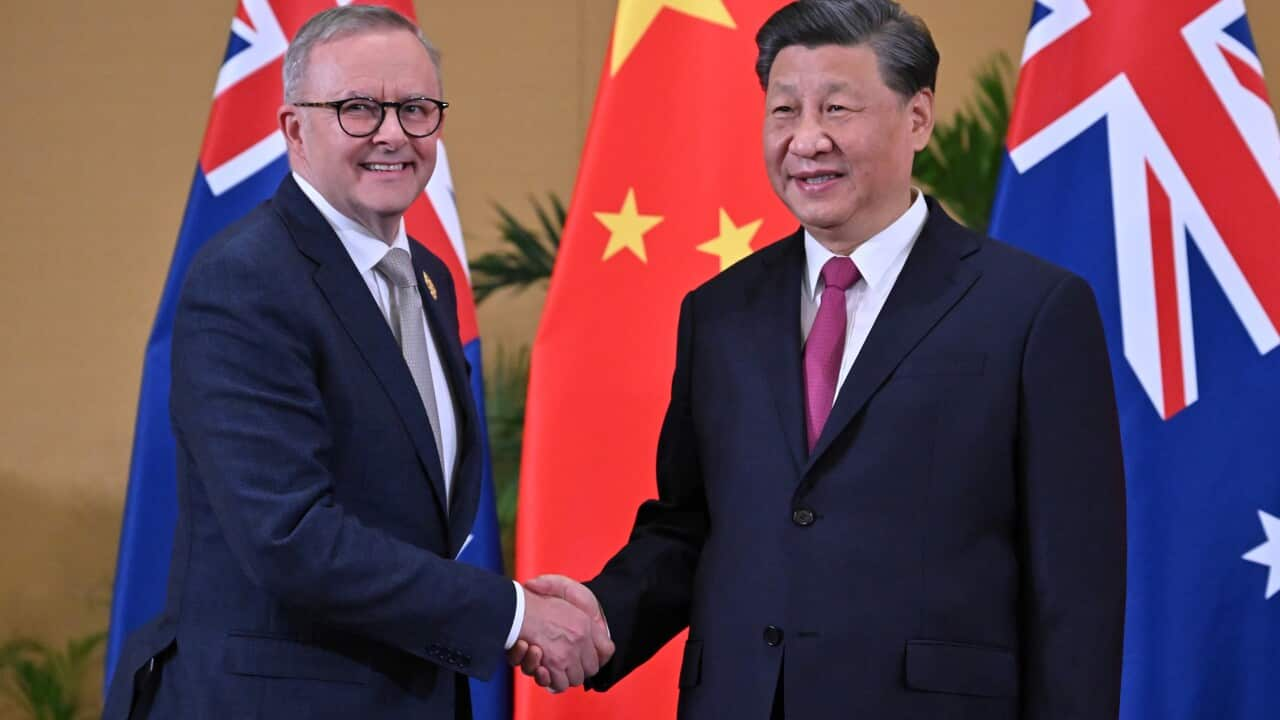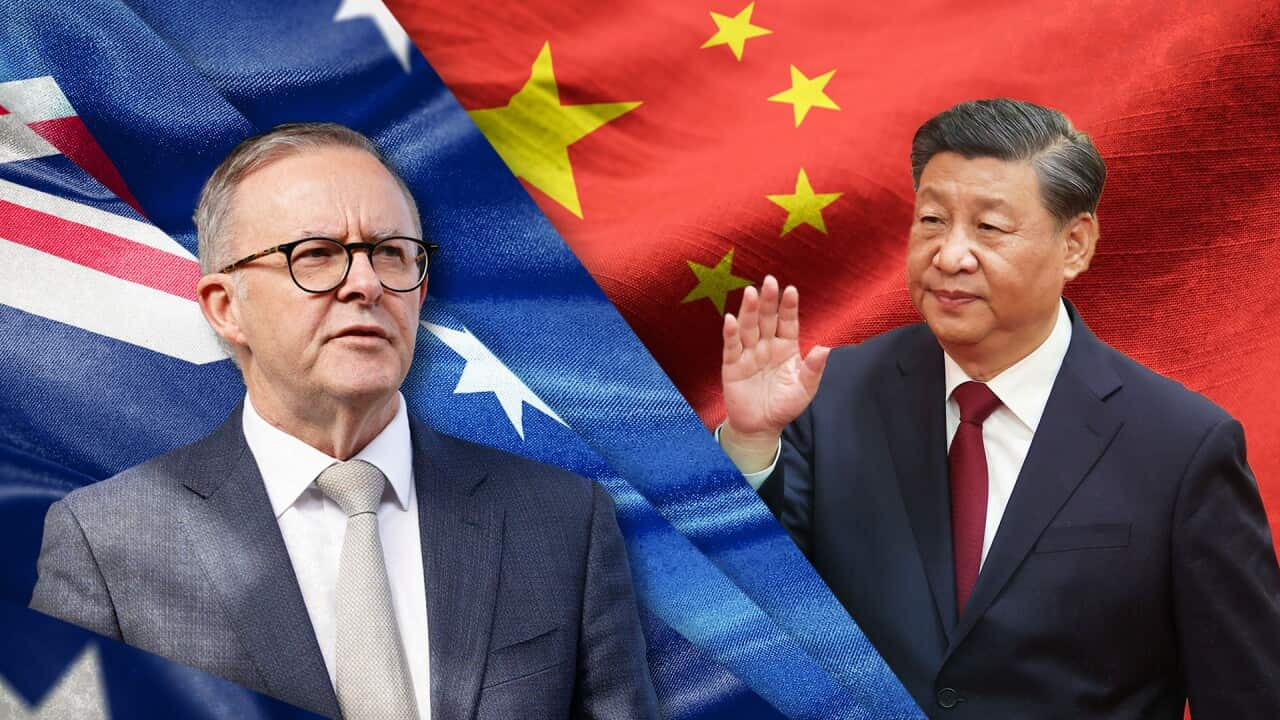KEY POINTS:
- Anthony Albanese will this weekend become the first Australian leader to visit China since 2016.
- The visit comes as relations between the two countries improve after years of trade tension.
- Trade, AUKUS, human rights, and detained Australian Yang Hengjun will likely be on the agenda.
Anthony Albanese is about to become the first Australian leader to travel to Beijing since 2016.
The prime minister will jet off on Saturday for , as Labor seeks to re-establish normality with Australia's biggest trading partner.
Relations between the two countries have plunged to unprecedented depths in the last few years, after the former Coalition government pushed for .
China responded by slapping tariffs on a number of Australian products and cutting off communications at the ministerial level.
While tensions have started to thaw since Albanese's election last May, it's too early to say winter has passed entirely.
Here are the key things to look out for.
Trade tariffs
De-escalating a long-running trade war will be high on the agenda.
In 2020, Beijing launched a series of sanctions on Australian products in an apparent act of retaliation for Australia's COVID-19 inquiry call. Beijing denied the two were linked.
- Barley
- Beef
- Timber
- Wine
- Lobster
- Cotton
But the situation has begun to turn in recent months.
In August, Beijing announced it was scrapping tariffs of more than 80 per cent it imposed on Australian barley back in 2020.

Relations between Australia and China deteriorated under the former Coalition government, led by Scott Morrison. Source: AAP / Mick Tsikas
While the tariffs could technically remain in place after the review concludes, Albanese has previously appeared confident Beijing will lift them entirely.
In return, Australia hit pause on its complaints over the tariffs before the World Trade Organisation.
Some analysts pinpoint the beginning of the trade war as far back as 2018, when .
Australian prisoners
The detention of Australian citizens in China is likely to be raised.
But again, a major breakthrough has already occurred before Albanese's trip.
The federal government confirmed last month that after more than three years in a Chinese jail.

Australian journalist Cheng Lei, picture alongside Foreign Minister Penny Wong, returned to Australia last month. Credit: Sarah Hodges
Beijing accused her of espionage and has said she was released after China's legal processes were completed.
But Australian pro-democracy writer Yang Hengjung remains behind bars.
Yang was detained in early 2019 and formally accused of espionage months later. He faced a closed-door trial in 2021, reportedly asking the judge to dismiss evidence he said was obtained under duress.
It has since been reported that Yang's health has deteriorated significantly, though he still holds hope of returning to Australia.

Yang Hengjun remains behind bars. Credit: AP
"We ask that you make clear that it is not possible to stabilise the bilateral relationship with a government that is holding an Australian citizen just a few kilometres south of where you will be hosted," they wrote.
The letter included passages from a recent consular report on Yang's condition, which noted he looked "pale and has lost weight" and had difficulty walking four metres from his cell bed to his toilet.
The children claimed Chinese authorities told Yang he had a 10cm cyst on his kidney, but would not provide him with further details.
"We have raised concerns, including at meetings I've had in the past with President Xi. Australia will always raise cases involving Australian citizens," Albanese told reporters on Tuesday.
"We're very pleased that Cheng Lei has been able to be rejoined with her daughters and her family in Melbourne. That was a good outcome, but we always raise cases of Australian citizens."
Human Rights violations in China
A number of human rights issues loom over the prime minister’s trip.
A United Nations report last year found China was responsible for , where it said there were "credible allegations" the Muslim Uyghur minority faced arbitrary detention, sexual violence, and forced medical treatment.

A picture posted on government social media in April 2017 purports to show Uyghur detainees in a camp in Hotan Prefecture. Source: Supplied / Supplied/HRW
Amnesty International has called on Albanese to raise the repression of Tibetans, Uyghurs, Hong Kongers, and Chinese human rights defenders.
Chinese human rights activist Xiaogang Zhang urged the prime minister to ensure diplomatic progress does not come at the cost of human rights.

The most intense civil unrest Hong Kong has experienced since its 1997 handover from British rule was sparked by Beijing's decision in August to restrict who can stand for the city's top post in elections in 2017. Credit: AP
"The visit is an opportunity for the Australian PM to [stand] firm on our democratic principles."
AUKUS tension
In September 2021, former prime minister Scott Morrison announced Australia was signing on to the pact with the US and UK. The deal created a new avenue for Australia to obtain nuclear-powered submarines, with Canberra scrapping a pre-existing deal with France.
But the deal, widely interpreted as an attempt to curb Chinese influence in the Indo-Pacific, infuriated Beijing, which accused the trio of heading down
a "path of error and danger ... for the sake of their own geopolitical interests" earlier this year.
Albanese immediately backed the plan from opposition, and in government announced the first tranche of spending through would see up to $358 billion allocated to nuclear-powered submarines over the next three decades.
Speaking alongside US President Joe Biden in Washington DC last month, Albanese said strategic competition in the Indo-Pacific was a "fact we are living with".
"The relationship with China is one where "The principle that I bring to [Australia's relationship with China] is to cooperate where we can, disagree where we must, but engage in our national interest," he said.
"It is in Australia’s interest, as well as China['s] ... for us to have a relationship where there is dialogue. And hence, I welcome the fact that I have been invited to China."










